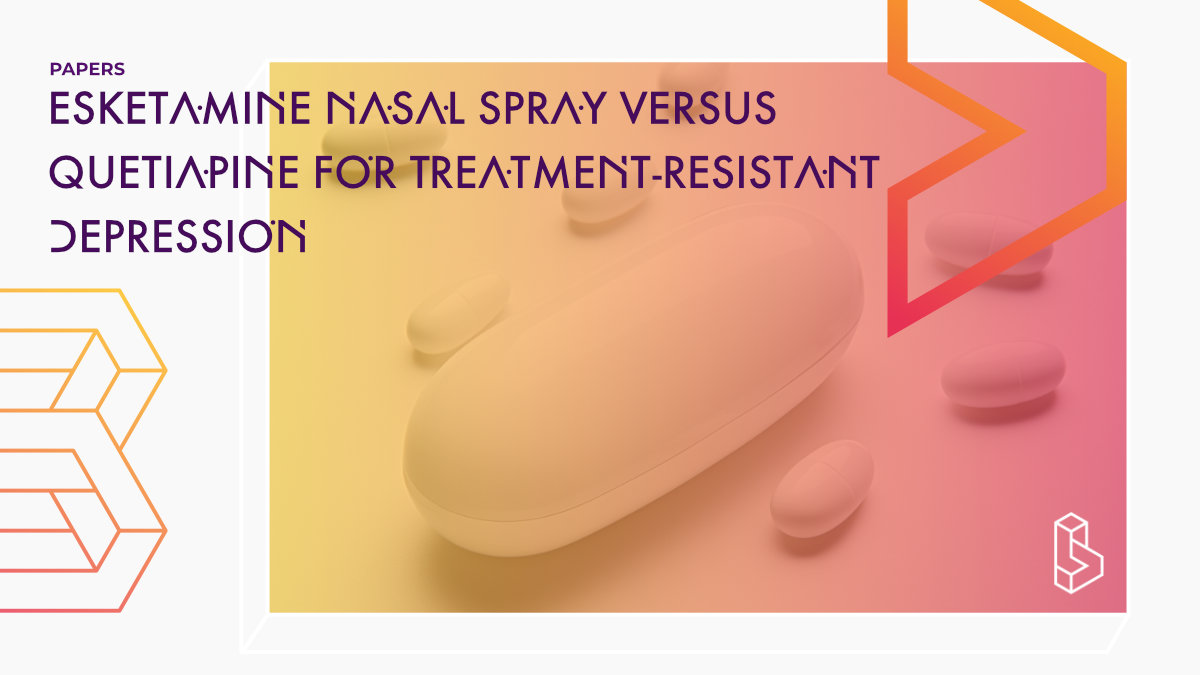This open-label Phase IIIb trial (n=676) compared the efficacy of esketamine nasal spray and extended-release quetiapine, combined with an SSRI or SNRI, in patients with treatment-resistant depression (TRD). The study found that a significantly higher percentage of patients in the esketamine group achieved remission at week 8 (27.1% vs 17.6%) and had no relapse through week 32 after remission at week 8 (21.7% vs 14.1%). Adverse events were consistent with the established safety profiles of the trial treatments.
Abstract of Esketamine Nasal Spray versus Quetiapine for Treatment-Resistant Depression
“Background In treatment-resistant depression, commonly defined as a lack of response to two or more consecutive treatments during the current depressive episode, the percentage of patients with remission is low and the percentage with relapse is high. The efficacy and safety of esketamine nasal spray as compared with extended-release quetiapine augmentation therapy, both in combination with ongoing treatment with a selective serotonin reuptake inhibitor (SSRI) or a serotonin–norepinephrine reuptake inhibitor (SNRI), in patients with treatment-resistant depression are unknown.
Methods In an open-label, single-blind (with raters unaware of group assignments), multicenter, phase 3b, randomized, active-controlled trial, we assigned patients, in a 1:1 ratio, to receive flexible doses (according to the summary of product characteristics) of esketamine nasal spray (esketamine group) or extended-release quetiapine (quetiapine group), both in combination with an SSRI or SNRI. The primary end point was remission, defined as a score of 10 or less on the Montgomery–Åsberg Depression Rating Scale (MADRS), at week 8 (scores range from 0 to 60, with higher scores indicating more severe depression). The key secondary end point was no relapse through week 32 after remission at week 8. All patients were included in the analysis; patients who discontinued the trial treatment were considered as having had an unfavorable outcome (i.e., they were grouped with patients who did not have remission or who had a relapse). Analyses of the primary and key secondary end points were adjusted for age and number of treatment failures.
Results Overall, 336 patients were assigned to the esketamine group and 340 to the quetiapine group. More patients in the esketamine group than in the quetiapine group had remission at week 8 (91 of 336 patients [27.1%] vs. 60 of 340 patients [17.6%]; P=0.003) and had no relapse through week 32 after remission at week 8 (73 of 336 patients [21.7%] vs. 48 of 340 patients [14.1%]). Over 32 weeks of follow-up, the percentage of patients with remission, the percentage of patients with a treatment response, and the change in the MADRS score from baseline favored esketamine nasal spray. The adverse events were consistent with the established safety profiles of the trial treatments.
Conclusions In patients with treatment-resistant depression, esketamine nasal spray plus an SSRI or SNRI was superior to extended-release quetiapine plus an SSRI or SNRI with respect to remission at week 8.”
Authors: Andreas Reif, Istvan Bitter, Jozefien Buyze, Kerstin Cebulla, Richard Frey, Dong-Jing Fu, Tetsuro Ito, Yerkebulan Kambarov, Pierre-Michel Llorca, Albino J. Oliveira-Maia, Thomas Messer & Siobhán Mulhern-Haughey
Summary of Esketamine Nasal Spray versus Quetiapine for Treatment-Resistant Depression
Initial treatment for major depressive disorder is aimed at achieving remission. However, in up to two thirds of patients, remission might not occur with initial antidepressant treatment, and many patients who require multiple treatments have a relapse within a year after remission.
Esketamine nasal spray, administered in combination with a newly initiated selective serotonin reuptake inhibitor (SSRI) or serotonin – norepinephrine reuptake inhibitor (SNRI), reduces depressive symptoms and the risk of relapse in patients with treatment-resistant depression.
Find this paper
Esketamine Nasal Spray versus Quetiapine for Treatment-Resistant Depression
https://doi.org/10.1056/nejmoa2304145
Paywall | Google Scholar | Backup | 🕊
Cite this paper (APA)
Reif, A., Bitter, I., Buyze, J., Cebulla, K., Frey, R., Fu, D. J., ... & Godinov, Y. (2023). Esketamine Nasal Spray versus Quetiapine for Treatment-Resistant Depression. New England Journal of Medicine, 389(14), 1298-1309.
Study details
Compounds studied
Ketamine
Topics studied
Treatment-Resistant Depression
Depression
Study characteristics
Single-Blind
Open-Label
Randomized
Participants
676
Humans
Institutes
Institutes associated with this publication
Janssen-CilagThis company doesn't have a full profile yet, it is linked to a clinical trial.
Linked Research Papers
Notable research papers that build on or are influenced by this paper
Esketamine Nasal Spray vs Quetiapine Extended-Release: Examining Work Productivity Loss and Related Costs in Patients With Treatment-Resistant DepressionThis secondary analysis (n=321) of the ESCAPE-TRD trial compared work productivity loss (WPL) and related costs in patients with treatment-resistant depression (TRD) receiving esketamine nasal spray (56mg or 84mg) versus quetiapine (atypical antipsychotic) extended release, both combined with an oral antidepressant. By week 8, WPL decreased by 30.3% with esketamine and 17.3% with quetiapine, leading to a cost savings difference of $156 per week. By week 32, WPL reductions were 45.3% (esketamine) and 32.5% (quetiapine), with a weekly cost savings difference of $153.
Efficacy of esketamine nasal spray over quetiapine extended release over the short and long term: sensitivity analyses of ESCAPE-TRD, a randomised phase IIIb clinical trial
This robustness analysis of the ESCAPE-TRD Phase IIIb trial (n=676) investigates esketamine nasal spray versus quetiapine extended release for treatment-resistant depression (TRD). Esketamine significantly outperformed quetiapine in achieving remission at week 8 (MADRS ≤10) and maintaining relapse-free status through week 32, with hazard ratios favouring esketamine (HR: 1.658–1.711, p < 0.001).
Linked Clinical Trial
A Long-term Comparison of Esketamine Nasal Spray Versus Quetiapine Extended Release, Both in Combination With a Selective Serotonin Reuptake Inhibitor/Serotonin-Norepinephrine Reuptake Inhibitor, in Participants With Treatment Resistant Major Depressive Disorder (ESCAPE-TRD)This Phase III interventional trial (n=676) will evaluate the efficacy of flexibly dosed esketamine nasal spray compared with quetiapine extended-release (XR), both in combination with a continuing selective serotonin reuptake inhibitor/serotonin-norepinephrine reuptake inhibitor (SSRI/SNRI), in achieving remission in participants with treatment-resistant major depressive disorder (MDD) experiencing a moderate to severe depressive episode.

